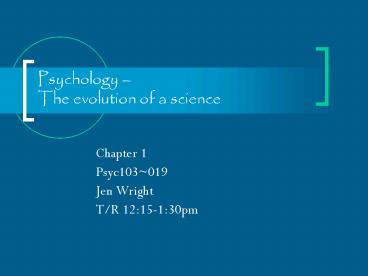Psychology The evolution of a science - PowerPoint PPT Presentation
1 / 24
Title:
Psychology The evolution of a science
Description:
Since it's inception, psychology has grappled with some ... Rational irrationality. Heuristics/biases. http://en.wikipedia.org/wiki/List_of_cognitive_biases ... – PowerPoint PPT presentation
Number of Views:37
Avg rating:3.0/5.0
Title: Psychology The evolution of a science
1
Psychology The evolution of a science
- Chapter 1
- Psyc103019
- Jen Wright
- T/R 1215-130pm
2
- What chapters do we want to cover?
- Questions from the syllabus?
3
history of psychology
- Since its inception, psychology has grappled
with some core questions concerning human nature. - Some of these core questions are as follows
4
Roots of psychology Q 1
- Nature vs. nurture
- Is what we know about the world innate or
learned? - Plato nativist
- Aristotle - empiricist
- Locke - empiricist
5
- Contemporary debate
- Jean Piaget ( others) empiricist
- Knowledge develops over time through the childs
active exploration of and interaction with the
world. - Hard-wired basic reflexes only
- Conservation task
6
(No Transcript)
7
Alison Gopnik ( others) - nativist
- Naïve physics
8
(No Transcript)
9
- Even a naïve morality?
- Premack Premack
10
some related questions
- To what extent are our personalities, actions,
choices determined by our genes (nature)? - By our environments (nurture)?
- In between nature and nurture, is there any room
for the individual? - To what extent are people in control of, or
responsible for, their actions?
11
- Social psychology study of individuals within
groups - To what extent is individual cognition/behavior
influenced by other people? - Cultural psychology study of individuals within
cultures - To what extent is individual cognition/behavior
influenced by cultural traditions/norms?
12
Roots of psychology Q 2
- What method gives us the best empirical access to
the mind? - Studying the brain?
- Descartes
- Gall
- Harlow
- Phineas Gage
13
- Studying conscious states?
- Introspection?
- Wundt/Tichener (structuralists)
- Break consciousness down into basic raw elements
14
- Wertheimer (Gestalt)
- Consciousness is organized stimuli
- Cant understand parts outside the whole
- http//dragon.uml.edu/psych/illusion.html
- James (functionalist)
- Evolutionary psychology
- Mental processes are adaptive
- Should be understood in terms of their function
15
Introductions
- On a piece of paper, please jot down the
following - Your name, student ID
- Year (rank) in school
- Contact info Phone/email
- Major/minor(s)
- Other psychology courses taken
- Name one thing that you would like to understand
better about 1) yourself, and 2) someone else. - Describe the most memorable human action (actual,
not fictional) that youve ever heard about? Ever
personally witnessed?
16
- Freud
- Much of mind is beyond introspective access
- Subconscious mind
- Many mental processes are maladaptive
- Humanist response
- Maslow Rogers
- Lower and higher needs human potential.
- Birth of positive psychology
17
- Stop looking for a mind and just study behavior!
- Behaviorism
- Pavlov
- Watson
- Skinner
response
stimulus
18
- Free will is an illusion
- Our behavior is merely a product of past and
present positive and negative reinforcement
patterns. - Punishment Reward system in brain
19
- Contemporary view
- The mind is not adaptive so much as adapted.
- To be understood as a response to evolutionary
pressures. - Rational irrationality
- Heuristics/biases
- http//en.wikipedia.org/wiki/List_of_cognitive_bia
ses
20
- Okay will the right ½ of the class please close
their eyes?
21
- Imagine that the U.S. is preparing for the
outbreak of a rare Asian disease that is expected
to kill 600 people. You must choose from one of
two treatment alternatives. Which of the
following would you choose - Alternative A 200 people will be saved.
- Alternative B a 1/3 chance all 600 will be
saved, 2/3 all 600 will die. - What alternative would you pick?
22
- Okay now the left ½ of the class.
23
- Imagine that the U.S. is preparing for the
outbreak of a rare Asian disease that is expected
to kill 600 people. You must choose from one of
two treatment alternatives. Which of the
following would you choose - Alternative A 400 people will die.
- Alternative B a 1/3 chance all 600 will be
saved, 2/3 all 600 die. - What alternative would you pick?
24
- When faced with the first scenario, 72 of
people are risk averse. - They will choose to go with option A.
- When faced with the second scenario, 78 will
will seek the risk on a chance of no losses. - They will choose to go with option B.
- Yet, both scenarios are the same.































